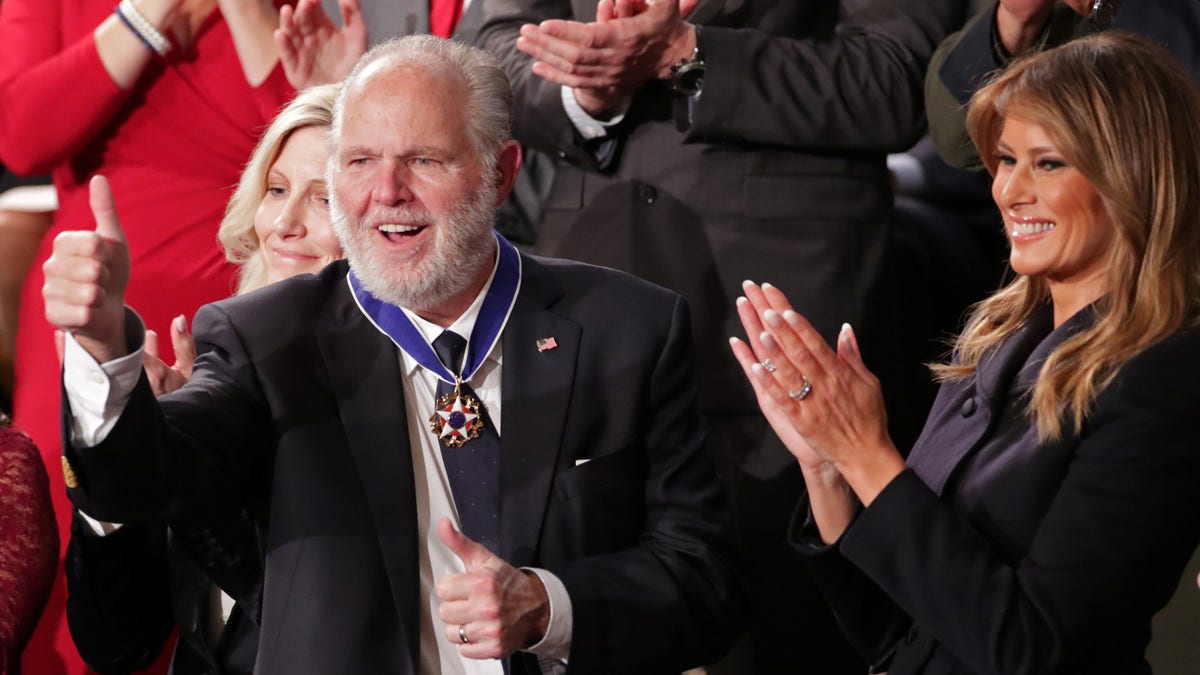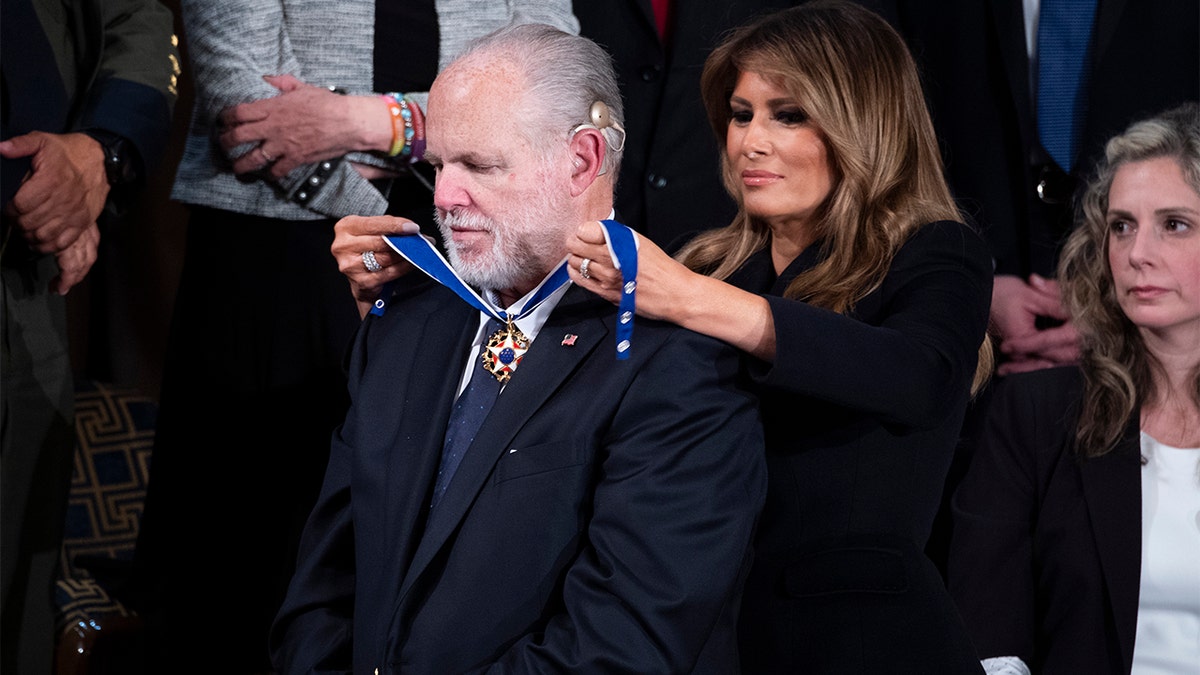Rush Limbaugh dead at 70 after cancer battle
Conservative talk radio pioneer Rush Limbaugh died at the age of 70 after a battle with lung cancer, his family announced.
This is our first Christmas without Rush Limbaugh, and for millions of us it is a terrible void.
In Charles Dickens’s "A Christmas Carol," a character soliciting charitable donations admonishes Scrooge that "at this festive season of the year…want is keenly felt." So is family grief. And, what will never be understood by his critics (most of whom never listened to him), Rush Limbaugh was undeniably a beloved brother-by-another-mother to so many of us.
RUSH LIMBAUGH DEAD: MOST MEMORABLE MOMENTS OF CONSERVATIVE RADIO TITAN'S LEGENDARY CAREER

Rush Limbaugh reacts as he is awarded the Presidential Medal of Freedom by first lady Melania Trump during President Trump's State of the Union address at the Capitol in Washington on Feb. 4, 2020. (REUTERS/Jonathan Ernst/File Photo)
Now, during what may be the last shared American tradition, Christmas, an absent Rush is a palpably missing presence—a missing voice—amidst the celebrations.
I almost couldn’t do it, but finally I put on Mannheim Steamroller’s "Stille Nacht," the achingly beautiful "Silent Night" that Rush broadcast every year as he signed off before Christmas. He would deliver his heartfelt year-end well-wishes and then let the music speak the holy season for him, the impossibly sweet violin and swelling orchestra subsiding into an echo of distant sleigh bells against a rushing wind.
I last heard it a year ago, as Rush spoke over the opening melody in an obvious goodbye. Uncharacteristically, his voice briefly trembled with emotion, but then, with the exquisite timing of a consummate broadcast professional to the very end, Rush used the musical backdrop to convey what he distilled into his most important message: gratitude — to his family, to us, his beloved audience, and to his Creator. "God is with me today," he said. "God knows how important this program is to me today."
When the program ended, I sat in silent tears—as did millions of fellow listeners, I’m sure of it. We all understood Rush was telling us that was to be his last Christmas; less than two months later he succumbed to lung cancer.
But not before leaving us with this: "My point in everything that I’m sharing with you is to say thank you, and to tell everybody involved how much I love you from the bottom of a sizable and growing and still beating heart. And there’s room for much more—all because I have learned what love really is." With those words, Rush closed what had become his favorite time of year, in which he could express his extraordinary generosity and appreciation and infectious joie de vivre to all around him.
But it wasn’t always this way. For a long time in the runup to each Christmas, Rush would turn melancholy. Our usually ebullient boss grew moody, seemingly in pain. He didn’t explain why, and we weathered the brief mysterious annual funk as supportively as we could. After the new year his sour demeanor would vanish as quickly as it appeared and we would all forget until the next year.

First lady Melania Trump awards Rush Limbaugh the Presidential Medal of Freedom during President Trump's State of the Union address at the Capitol on Feb. 4, 2020. (Tom Williams/CQ-Roll Call, Inc via Getty Images)
At the first hint of seasonal sadness we (proud members of his "highly overrated staff") would remind each other, "Oh yeah. Christmas."
In those days, some of us theorized it might have something to do with missing his dad, Rush Limbaugh, Jr., who died in December 1990 at the very start of his son’s astonishing success trajectory. We also surmised the passing of his mom, Millie, may have added to his gloom. But Rush didn’t say any of that; we just guessed. Although he shared so much of his life, his passions, his irrepressible laughter, and his wisdom with his audience, he was also intensely private; he didn’t divulge hurt. As he put it, he didn’t want to "bleed all over people."
Enter, Chip Davis, the founder and leader of the neoclassical musical group whose specialty is Christmas music. In the early 1990s Rush jetted the entire New York staff to a Mannheim Steamroller Christmas concert in Chicago. It was in those days he also started playing a few of his favorite selections as bumper music, and gradually added longer snippets on the air — until in the last ten years, those annual carols became signature Rush. There is no way I will ever be able to hear Mannheim Steamroller’s triumphant synthesizer-and-brass "Deck the Halls" again without expecting Rush’s joyful voice coming back from an advertising break.
CLICK HERE TO GET THE OPINION NEWSLETTER
My personal theory is that genius recognized genius—the unique combination of depth, creative originality, and Christian tradition shared by the two performers is perhaps what helped Rush, a man of words, convey through Chip’s music some of the deepest truth he knew and felt. Both time and Yuletide tunes let Rush express the inexpressible, his longing and loss intertwined with gratitude and love.
CLICK HERE TO GET THE FOX NEWS APP
Of course, it wasn’t nearly as simple as just that. Rush was a profoundly complex person. His Christmas transformation didn’t happen all at once, but over the long arc of what I’d dare call his own redemption story. Exquisite spiritual yearning found its fulfillment in Christ, as Rush said explicitly. And this is how that looked: after Rush got sick, he regularly declared on the air, "Every day remains a gift. I wake up and the first thing I do is thank God that I did." Rush’s grateful prayer to the Giver of Life is where Christmas begins. Glory to God in the highest.





